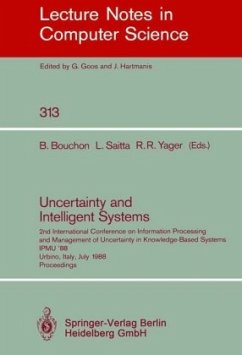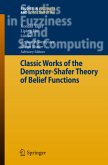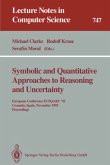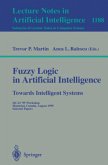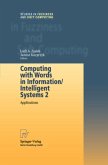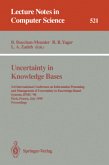Bernadette Bouchon / Lorenza Saitta / Ronald R. Yager (eds.)2nd International Conference on Information Processing and Management of Uncertainty in Knowledge Based Systems IPMU '88. Urbino, Italy, July 4-7, 1988. Proceedings
Uncertainty and Intelligent Systems
2nd International Conference on Information Processing and Management of Uncertainty in Knowledge Based Systems IPMU '88. Urbino, Italy, July 4-7, 1988. Proceedings
Mitarbeit:Bouchon-Meunier, Bernadette; Saitta, Lorenza; Yager, Ronald R.
Bernadette Bouchon / Lorenza Saitta / Ronald R. Yager (eds.)2nd International Conference on Information Processing and Management of Uncertainty in Knowledge Based Systems IPMU '88. Urbino, Italy, July 4-7, 1988. Proceedings
Uncertainty and Intelligent Systems
2nd International Conference on Information Processing and Management of Uncertainty in Knowledge Based Systems IPMU '88. Urbino, Italy, July 4-7, 1988. Proceedings
Mitarbeit:Bouchon-Meunier, Bernadette; Saitta, Lorenza; Yager, Ronald R.
- Broschiertes Buch
- Merkliste
- Auf die Merkliste
- Bewerten Bewerten
- Teilen
- Produkt teilen
- Produkterinnerung
- Produkterinnerung
This book contains the papers presented at the 2nd IPMU Conference, held in Urbino (Italy), on July 4-7, 1988. The theme of the conference, Management of Uncertainty and Approximate Reasoning, is at the heart of many knowledge-based systems and a number of approaches have been developed for representing these types of information. The proceedings of the conference provide, on one hand, the opportunity for researchers to have a comprehensive view of recent results and, on the other, bring to the attention of a broader community the potential impact of developments in this area for future…mehr
Andere Kunden interessierten sich auch für
![Classic Works of the Dempster-Shafer Theory of Belief Functions Classic Works of the Dempster-Shafer Theory of Belief Functions]() Arthur P. Dempster / Ronald Yager / Liping Liu (eds.)Classic Works of the Dempster-Shafer Theory of Belief Functions231,99 €
Arthur P. Dempster / Ronald Yager / Liping Liu (eds.)Classic Works of the Dempster-Shafer Theory of Belief Functions231,99 €![Symbolic and Quantitative Approaches to Reasoning and Uncertainty Symbolic and Quantitative Approaches to Reasoning and Uncertainty]() ClarkeSymbolic and Quantitative Approaches to Reasoning and Uncertainty39,99 €
ClarkeSymbolic and Quantitative Approaches to Reasoning and Uncertainty39,99 €![Technologies for Constructing Intelligent Systems 2 Technologies for Constructing Intelligent Systems 2]() Bernadette Bouchon-Meunier / Julio Gutierrez-Rios / Luis Magdalena / Ronald R. Yager (eds.)Technologies for Constructing Intelligent Systems 2115,99 €
Bernadette Bouchon-Meunier / Julio Gutierrez-Rios / Luis Magdalena / Ronald R. Yager (eds.)Technologies for Constructing Intelligent Systems 2115,99 €![Fuzzy Logic in Artificial Intelligence: Towards Intelligent Systems Fuzzy Logic in Artificial Intelligence: Towards Intelligent Systems]() MartinFuzzy Logic in Artificial Intelligence: Towards Intelligent Systems39,99 €
MartinFuzzy Logic in Artificial Intelligence: Towards Intelligent Systems39,99 €![Computing with Words in Information/Intelligent Systems 2 Computing with Words in Information/Intelligent Systems 2]() Lotfi A. Zadeh / Janusz Kacprzyk (eds.)Computing with Words in Information/Intelligent Systems 2115,99 €
Lotfi A. Zadeh / Janusz Kacprzyk (eds.)Computing with Words in Information/Intelligent Systems 2115,99 €![Uncertainty in Knowledge Bases Uncertainty in Knowledge Bases]() Bouchon-MeunierUncertainty in Knowledge Bases77,99 €
Bouchon-MeunierUncertainty in Knowledge Bases77,99 €![Advances in Artificial Intelligence Advances in Artificial Intelligence]() OliveiraAdvances in Artificial Intelligence39,99 €
OliveiraAdvances in Artificial Intelligence39,99 €-
-
-
This book contains the papers presented at the 2nd IPMU Conference, held in Urbino (Italy), on July 4-7, 1988. The theme of the conference, Management of Uncertainty and Approximate Reasoning, is at the heart of many knowledge-based systems and a number of approaches have been developed for representing these types of information. The proceedings of the conference provide, on one hand, the opportunity for researchers to have a comprehensive view of recent results and, on the other, bring to the attention of a broader community the potential impact of developments in this area for future generation knowledge-based systems. The main topics are the following: frameworks for knowledge-based systems: representation scheme, neural networks, parallel reasoning schemes; reasoning techniques under uncertainty: non-monotonic and default reasoning, evidence theory, fuzzy sets, possibility theory, Bayesian inference, approximate reasoning; information theoretical approaches; knowledge acquisition and automated learning.
Produktdetails
- Produktdetails
- Lecture Notes in Computer Science 313
- Verlag: Springer / Springer Berlin Heidelberg / Springer, Berlin
- Artikelnr. des Verlages: 978-3-540-19402-6
- 1988.
- Seitenzahl: 420
- Erscheinungstermin: 8. Juni 1988
- Englisch
- Abmessung: 235mm x 155mm x 23mm
- Gewicht: 684g
- ISBN-13: 9783540194026
- ISBN-10: 3540194029
- Artikelnr.: 09223411
- Herstellerkennzeichnung
- Springer-Verlag GmbH
- Tiergartenstr. 17
- 69121 Heidelberg
- ProductSafety@springernature.com
- Lecture Notes in Computer Science 313
- Verlag: Springer / Springer Berlin Heidelberg / Springer, Berlin
- Artikelnr. des Verlages: 978-3-540-19402-6
- 1988.
- Seitenzahl: 420
- Erscheinungstermin: 8. Juni 1988
- Englisch
- Abmessung: 235mm x 155mm x 23mm
- Gewicht: 684g
- ISBN-13: 9783540194026
- ISBN-10: 3540194029
- Artikelnr.: 09223411
- Herstellerkennzeichnung
- Springer-Verlag GmbH
- Tiergartenstr. 17
- 69121 Heidelberg
- ProductSafety@springernature.com
Application of linear utility theory to belief functions.- A new approach to introducing semantics and subjectivity in approximate reasoning.- Belief functions versus probability functions.- Inference via belief qualified if - Then rules based on compatibility relations and possibility theory.- Fixed point theorems for fuzzy mappings.- Convergence properties of classes of decomposable measures.- Some geometrical properties of trapezoidal functions for their association with linguistic labels leading to a reduced 2-D representation.- Decidability and recursive enumerability for fuzzy subsets.- Stability of linguistic modifiers compatible with a fuzzy logic.- Some maximum likelihood estimators for the fuzzy linear model.- On orderings of fuzzy numbers.- An alternative semantics for linguistic variables.- Suboptimum decoding using Kullback principle.- The choice of sample size in estimating entropy according to a stratified sampling.- Information measures from rate-distortion theories.- Piecewise linear fuzzy quantities : A way to implement fuzzy information into expert systems and fuzzy databases.- Sets and uncertainty in relational databases.- Answering queries addressed to the rule base of a deductive database.- A model for the management of imprecise queries in relational databases.- Constructive learning with continuous-valued attributes.- A model for learning by source control.- Controlling inductive search in rigel learning system.- Uncertainty in a numeric concept discovery system.- On generating linguistic rules for fuzzy models.- Learning driven by the concepts structure.- Checking a rule base with certainty factor for incompleteness and inconsistency.- Modeling experiential knowledge with procedural schemata of holistic perception.- Congruence of structures inurban knowledge representation.- Time representation: An example.- Fuzzy qualitative modeling.- Knowledge representation systems syntactic methods.- A logical approach to deal with incomplete causal models in diagnostic problem solving.- A many valued logic of belief: Detachment operators.- Thresholds for certainty and the modal logic S3.- Knowledge acquisition on neural networks.- Neural net connection estimates applied for feature selection & improved linear classifier design.- Modulation of the intensity of formalized attributes.- Inflammatory protein variations: Medical knowledge representation and approximate reasoning.- Sequential bayesian test from fuzzy experimental information.- An intuitive representation of imperfect information.- A method for determination of evidential weighting factors in a medical expert system.- A study of arab computer users: A special case of a general HCI methodolgy.- Knowledge-based systems application to reduce risk in software requirements.- Prioritized, non-pointwise, nonmonotonic intersection and union for commonsense reasoning.- Multi-criteria decision making in terms of probabilistic sets.- Putting into practice Moreau's extended generalized modus ponens.- Evidence aggregation in expert judgments.- Conditioning in possibility and evidence theories - A logical viewpoint -.
Application of linear utility theory to belief functions.- A new approach to introducing semantics and subjectivity in approximate reasoning.- Belief functions versus probability functions.- Inference via belief qualified if - Then rules based on compatibility relations and possibility theory.- Fixed point theorems for fuzzy mappings.- Convergence properties of classes of decomposable measures.- Some geometrical properties of trapezoidal functions for their association with linguistic labels leading to a reduced 2-D representation.- Decidability and recursive enumerability for fuzzy subsets.- Stability of linguistic modifiers compatible with a fuzzy logic.- Some maximum likelihood estimators for the fuzzy linear model.- On orderings of fuzzy numbers.- An alternative semantics for linguistic variables.- Suboptimum decoding using Kullback principle.- The choice of sample size in estimating entropy according to a stratified sampling.- Information measures from rate-distortion theories.- Piecewise linear fuzzy quantities : A way to implement fuzzy information into expert systems and fuzzy databases.- Sets and uncertainty in relational databases.- Answering queries addressed to the rule base of a deductive database.- A model for the management of imprecise queries in relational databases.- Constructive learning with continuous-valued attributes.- A model for learning by source control.- Controlling inductive search in rigel learning system.- Uncertainty in a numeric concept discovery system.- On generating linguistic rules for fuzzy models.- Learning driven by the concepts structure.- Checking a rule base with certainty factor for incompleteness and inconsistency.- Modeling experiential knowledge with procedural schemata of holistic perception.- Congruence of structures inurban knowledge representation.- Time representation: An example.- Fuzzy qualitative modeling.- Knowledge representation systems syntactic methods.- A logical approach to deal with incomplete causal models in diagnostic problem solving.- A many valued logic of belief: Detachment operators.- Thresholds for certainty and the modal logic S3.- Knowledge acquisition on neural networks.- Neural net connection estimates applied for feature selection & improved linear classifier design.- Modulation of the intensity of formalized attributes.- Inflammatory protein variations: Medical knowledge representation and approximate reasoning.- Sequential bayesian test from fuzzy experimental information.- An intuitive representation of imperfect information.- A method for determination of evidential weighting factors in a medical expert system.- A study of arab computer users: A special case of a general HCI methodolgy.- Knowledge-based systems application to reduce risk in software requirements.- Prioritized, non-pointwise, nonmonotonic intersection and union for commonsense reasoning.- Multi-criteria decision making in terms of probabilistic sets.- Putting into practice Moreau's extended generalized modus ponens.- Evidence aggregation in expert judgments.- Conditioning in possibility and evidence theories - A logical viewpoint -.

